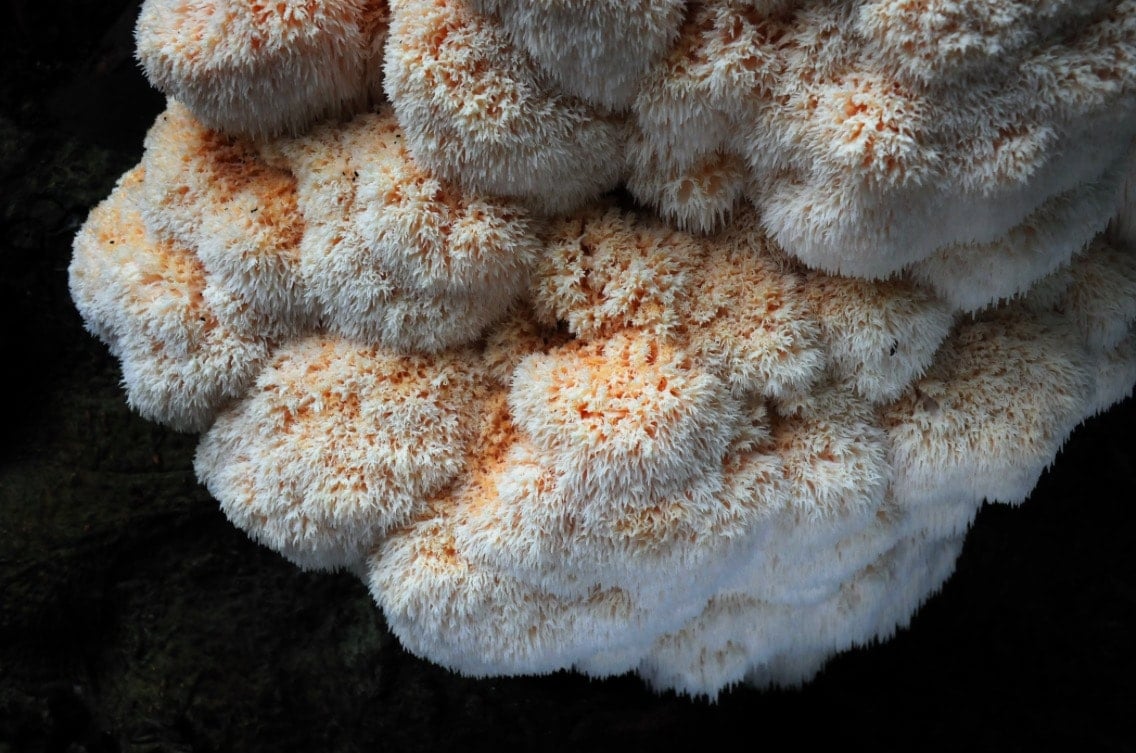Overview
Lion’s Mane mushroom (Hericium erinaceus) is one of the most potent and fascinating supplement for brain health. Known for its unique, spiny, white appearance that resembles a lion’s mane (hence the name), this medicinal mushroom has been used for centuries in traditional Chinese medicine. Currently, mushrooms such as Chaga, Reishi ,and Lion’s Mane are attracting global attention for their potential health benefits.
What is Lion’s Mane?
Lion’s Mane is a type of edible mushroom that grows on hardwood trees, particularly oak, beech, and maple. The mushroom’s most distinctive feature is its white, fluffy, spiky appearance, resembling either a lion’s mane or even a flowing waterfall of threads. Native to Asia, Europe, and North America, Lion’s Mane has long been treasured for its medicinal properties which include supporting cognitive function and promoting nerve growth.
Traditionally, it was consumed to improve longevity, enhance mental clarity, and support overall wellness. It is often used in both culinary dishes and supplements due to its diverse range of bioactive compounds.

Health Benefits of Lion’s Mane
1. The Brain-Boosting Benefits of Lion’s Mane
When it comes to cognitive health, Lion’s Mane has earned a reputation as an effective nootropic. Here’s how it can facilitate brain function:
- Improves Cognitive Function
Lion’s Mane possesses compounds that stimulate the growth and repair of brain cells. Research demonstrates that this mushroom comprises compounds called hericenones and erinacines, which encourage the production of nerve growth factor (NGF). NGF is essential for the maintenance, survival, and development of neurons in the brain.
By stimulating NGF production, Lion’s Mane may help improve memory, focus, and mental clarity, especially in people experiencing cognitive decline. Some studies demonstrate that Lion’s Mane possess anti-dementia properties making it beneficial for individuals suffering from neurodegenerative conditions like Alzheimer’s and Parkinson’s; however further research is needed to validate these findings.
- Supports Mental Health
Lion’s Mane isn’t just about enhancing cognitive function; it may also aid in mental health improvement. Research has shown that it can help reduce symptoms of anxiety and depression. A particular study involving stressed mice revealed that those who consumed Lion’s Mane mushroom over four weeks showed significant improvement in their mood and overall well-being showcasing the mushroom’s ability to treat depression issues.
The mushroom’s neuroprotective effects and its ability to promote nerve growth play a crucial role in balancing the brain’s neurochemistry, potentially providing relief from symptoms of anxiety and depression.
- Enhances Memory and Learning
Lion’s Mane may improve memory and learning abilities. The NGF-boosting effects of the mushroom can help increase neuroplasticity—the brain’s ability to reorganize and forge new neural pathways. Research conducted on mice indicates that a daily intake of at least 5 mg/kg/day of this mushroom can help improve recognition memory This makes it particularly beneficial for individuals who want to improve their ability to learn, retain new information, and sharpen their concentration.
- Neuroprotective and Anti-Inflammatory
Beyond its cognitive benefits, Lion’s Mane is packed with strong antioxidants and anti-inflammatory compounds, such as polysaccharides, hericenones, and erinacines, which help protect the brain from oxidative stress and damage caused by inflammation. Chronic inflammation in the brain is often associated with neurological disorders like Alzheimer’s; therefore by reducing this inflammation, Lion’s Mane may help protect brain cells and promote overall brain health.
2. Immune System Support
Like other mushrooms, Lion’s Mane is rich in antioxidants and polysaccharides, which help combat oxidative stress and boost the immune system. These compounds aid in fortifying the body’s defense mechanisms, helping to combat infections and diseases. Regular consumption may help keep maintain optimal immune health, especially as age decline sets in.
3. Supports Digestive Health
Lion’s mane has been used for centuries to treat gastrointestinal issues. It may help protect the gut lining, reduce inflammation, and prevent ulcer. The prebiotic fibers found in this mushroom support the growth of healthy gut microbiome. A balanced gut microbiome is essential for digestion, immune function, and mental health, as the gut and brain are closely connected.
4. Promotes Heart Health
Studies have shown that Lion’s Mane might aid in cardiovascular health by preventing the oxidation of low-density lipoprotein (LDL) cholesterol, thereby reducing the risk of heart attack and stroke. Furthermore, hericenone B, a compound found in Lion’s Mane has been demonstrated to prevent unnecessary blood clotting by inhibiting platelet aggregation, further lowering the risk of heart attack and stroke.
How to Add Lion’s Mane to Your Diet
Lion’s Mane can be consumed in various forms, including fresh mushrooms, powdered extracts, and capsules. Here are some popular ways to add it into your meals:
- Fresh Lion’s Mane Mushroom: If you can find fresh Lion’s Mane at a local farmer’s market or specialty grocery store, it can be sautéed or cooked just like any other mushroom. It has a mild, slightly sweet flavor and a texture that can be compared to seafood, particularly lobster or crab.
- Lion’s Mane Powder: For those who don’t have access to fresh mushrooms, powdered Lion’s Mane is widely available in health food stores and online. You can mix the powder into smoothies, coffee, teas, or soups for an easy boost to your daily routine.
- Capsules or Tablets: If you prefer a straight-forward option, Lion’s Mane supplements in the form of capsules or tablets are an easy way to take the mushroom’s benefits without any taste. Be sure to choose a high-quality supplement with a proper dosage of the active compounds.
- Lion’s Mane Tea: Lion’s Mane tea is a calming and effective way to enjoy its cognitive benefits. Simply steep a tea bag or loose mushroom powder in hot water, and enjoy the natural flavor with added brain-boosting benefits.
Potential Side Effects and Considerations
Lion’s Mane is generally considered safe for most people, with minimal side effects. However, as with any new food or supplement, it is important to listen to your body. Some people may experience mild digestive discomfort or allergic reactions, particularly if they have a sensitivity to mushrooms.
Pregnant or nursing women, as well as individuals with autoimmune conditions, should consult their healthcare provider before adding Lion’s Mane to their diet, just to be safe.
Conclusion
Lion’s Mane is packed with numerous health benefits. From boosting brain health and memory to supporting the immune system and improving mood, this mushroom provides a simple yet effective way to boost your health as you age in a natural and holistic way.
With its long history of use in traditional medicine and an increasing amount of scientific research backing its benefits, this mushroom may just be the cognitive enhancer you have been searching for.
Ready to give it a try? Adding Lion’s mane to your daily regimen may be one of the best health decisions for your health.
Remember, while Lion’s Mane may be a promising supplement for brain health, it is essential to note that no single food or supplement can replace a healthy diet and lifestyle. Always consult with a healthcare professional before making changes to your wellness routine.
Frequently asked Questions on Lion’s Mane
What is the recommended dosage of lion’ Mane?
The recommended dosage varies based on the form (powder, capsule, extract) and the concentration. A general guideline is;
- Powder: 1-3 grams daily
- Extract: 50-1000 mg daily. It is generally advisable to begin with a lower dose and gradually increase it to observe how you body reacts.
How long does it take to see results?
Responses may vary, but some people report noticing benefits within a few weeks of consistent use. For cognitive and neurological benefits, it may take several months of consistent consumption.
Can Lion’s Mane help with Alzheimer’s, dementia and other neurodegenerative conditions?
Lion’s Mane may support brain health and possibly slow down cognitive decline. though additional research may be necessary to confirm its effectiveness for Alzheimer’s, dementia, or other neurodegenerative conditions. It is not a substitute for medical treatment and individuals with such conditions should seek professional advise from a healthcare provider.
Where can I buy Lion’s Mane?
Lion’s Mane supplements and products are available at:
- Health food stores.
- Online marketplaces.
- Local farmers’ markets (for fresh or dried mushrooms).
How do I store Lion’s mane?
- Fresh mushrooms: Store in the refrigerator for no longer than a week.
- Dried Mushrooms: Keep in an airtight container in a cool, dry place.



